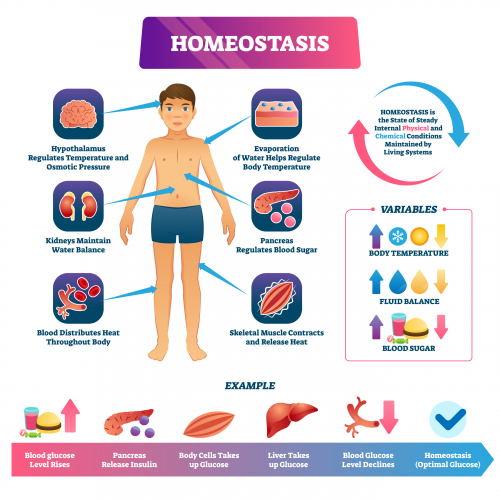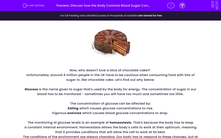
Now, who doesn't love a slice of chocolate cake?!
Unfortunately, around 4 million people in the UK have to be cautious when consuming food with lots of sugar in, like chocolate cake. Let's find out why below:
Glucose is the name given to sugar that's used by the body for energy. The concentration of sugar in our blood has to be monitored - sometimes you will have too much and sometimes too little.
The concentration of glucose can be affected by:
Eating which causes glucose concentrations to rise.
Vigorous exercise which causes blood glucose concentrations to drop.
The monitoring of glucose levels is an example of homeostasis. That's because the body has to keep a constant internal environment. Homeostasis allows the body’s cells to work at their optimum, meaning that it provides conditions that will allow the cell to work at its best.
The conditions of the environment are always changing. Our body has to respond to these changes, but at the same time ensure that certain internal conditions don't vary too much, otherwise, damage could be caused.

Glucose is monitored and controlled by the pancreas. The pancreas produces different hormones in response to the concentrations of glucose.
Insulin is a hormone that's released when blood glucose concentrations are high. It binds to receptors on cell membranes that cause cells to take in glucose - this glucose is used for respiration. Excess glucose is stored as glycogen in the liver and muscles. This is called glycogenesis.
When blood glucose concentrations are low, the pancreas doesn't secrete insulin into the blood. This means the liver won't convert glucose to glycogen, leaving glucose in the blood. This is one way to maintain normal glucose concentrations.
Glucagon is another hormone involved in maintaining blood glucose concentrations. When blood glucose concentrations are low, glucagon is released from the pancreas, which causes stored glycogen in the liver to convert to glucose. This is called glycogenolysis. By doing this, the body can raise blood glucose concentrations back to normal. This is an example of negative feedback in the body.
Diabetes is a condition where blood glucose concentrations aren't maintained - they can get super high, or low and cause all sorts of issues. There are two types of diabetes: type 1 and type 2.

Type 1 Diabetes:
The pancreas doesn't produce enough of the hormone insulin.
Blood glucose concentrations are uncontrollably high.
It is treated with insulin injections.
Type 2 Diabetes:
Insulin is produced but liver and muscle cells no longer respond to it.
People who are obese are at risk.
It is controlled by limiting simple carbohydrates in the diet and by taking more exercise.
By controlling the types of food they eat, diabetics are able to regulate how much sugar is released into the blood through digestion.
Regular exercise means that glucose in the blood will be utilised by cells for increased respiration (which means more energy), this will lower blood glucose concentrations. This helps diabetics to regulate their blood glucose concentrations.

In the following activity, you will discuss how the body uses negative feedback to control the concentration of glucose in the blood.







